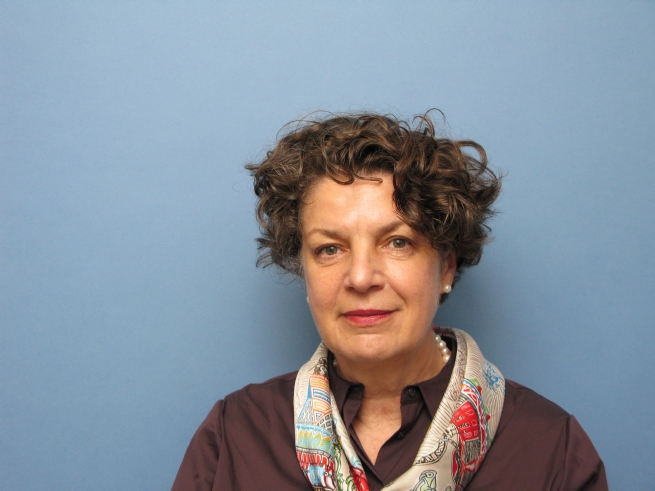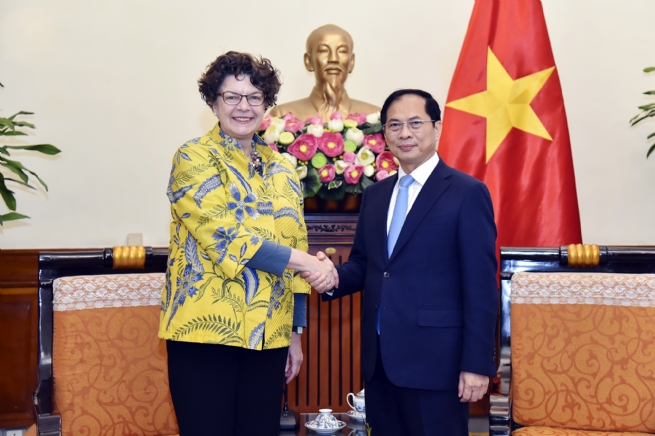9:54:33 AM | 9/15/2025
In 2025, Vietnam and Germany mark a significant milestone: the 50th anniversary of diplomatic relations, established on 23 September 1975. Over the past five decades, the two nations have built a comprehensive and forward-looking partnership that has grown steadily across all domains - from political and economic cooperation to cultural exchange, education, and sustainable development. To mark the occasion, we have set up a comprehensive celebratory program.
 |
Germany's anniversary program is carried out under the patronage of the German Embassy and in close cooperation with the Goethe-Institut, the Representative of German Commerce and Trade as well the "Deutsche Gesellschaft für Internationale Zusammenarbeit" (GIZ) and many other official German institutions. The anniversary year was launched with a press conference where the official logo for the anniversary year was officially presented. It had been selected in close cooperation with the Ministry of Culture, Sports and Tourism through a nationwide design competition. The logo has since become a unifying visual mark of the celebrations carried out under the label #50VietDuc.
In February, the spectacular gala concert “Berlin im Licht”, featuring sopranos Katharine Mehrling and Dao To Loan, was presented both in Hanoi and Ho Chi Minh City. In May, sport took center stage when the women’s team of SV Werder Bremen played a friendly football match against the Vietnamese national women’s team, underscoring the role of sport as a bridge between societies. Other creative initiatives have engaged younger audiences, among them the essay competition “A Day as an Ambassador” around International Women’s Day and the Career Days held in Hanoi and Ho Chi Minh City, designed to strengthen educational and professional exchange.
In the coming months, the anniversary program will continue to bring people together across Vietnam. The innovative German Career Truck, which began touring the country in April, will continue its nation-wide journey until November 2025, stopping in Hanoi, Bac Ninh, Hue, Da Nang, Nha Trang, Ho Chi Minh City, and other provinces to engage with a young audience with the aim to inform about career opportunities in Germany and safe migration pathways. A major highlight will be the Deutschlandfest at Hoan Kiem Lake in Hanoi from 17 to 19 October, focusing particularly on the achievements of German–Vietnamese development cooperation over the past five decades. Finally, music lovers can look forward to the upcoming concert by Thomas Anders, the former lead singer of Modern Talking, on 25 October in Hanoi.
The history of diplomatic relations between Vietnam and Germany reflects resilience, adaptability, and trust. Diplomatic ties were officially established in 1975, at a time when the Cold War still shaped the global order. Despite this challenging context, the two countries began to explore cooperation in trade, development, and cultural exchange. The 1990s brought new opportunities: German reunification and Vietnam’s economic reforms under Đổi Mới opened pathways for deeper ties. A key actor in this phase was the diverse Vietnamese community in Germany. Their presence helped create strong people-to-people bonds that remain vital to this day.

Deputy Prime Minister Bui Thanh Son (R) receives German Ambassador Helga Margarete in Hanoi, February 2025
In 1995, the establishment of the German Business Association (GBA) marked an institutional milestone. It became one of the first foreign business associations in Vietnam, helping to support German companies in building a presence in the rapidly growing Vietnamese market. In 2008, the bilateral relationship was formally elevated to a Strategic Partnership, a status that reflected growing collaboration in energy, science, technology, environmental protection, and education. This was soon followed in 2011 by a Strategic Action Plan, which defined key areas of cooperation including legal reform, governance, and sustainable economic development. Another landmark came in 2013 with the inauguration of the German House (Deutsches Haus) in Ho Chi Minh City, a modern hub for business, cultural exchange, and dialogue that stands as a visible symbol of Germany’s long-term engagement in Vietnam.
These milestones highlight how bilateral relations have moved from modest beginnings to complex, multifaceted cooperation. From development assistance projects in the early years to strategic collaboration on global challenges and security issues, the partnership has grown in both scope and depth.
Economics and trade have long been central pillars of the relationship. Germany is Vietnam’s largest trading partner within the European Union, while Vietnam has become Germany’s most important partner in ASEAN. Bilateral trade now exceeds US$22 billion annually and spans a wide range of sectors: machinery and automotive components, pharmaceuticals, textiles, electronics, and agricultural products. The implementation of the EU–Vietnam Free Trade Agreement (EVFTA) has given bilateral commerce further momentum. German companies increasingly see Vietnam not only as a production hub, but also as a fast-growing consumer market in Asia. At the same time, Vietnam benefits from German technology, quality standards, and access to European supply chains, making trade cooperation a win–win dynamic.
Development cooperation has been another cornerstone of bilateral relations. Since the early 1990s, Germany has provided more than € 2 billion in official development assistance (ODA) to Vietnam, focusing on renewable energy, energy efficiency, sustainable urban development, vocational training, employment generation, environmental protection, biodiversity conservation, legal reform, and good governance. These areas align closely with Vietnam’s own development priorities, particularly its efforts to transition to a green and circular economy.
Through the Deutsche Gesellschaft für Internationale Zusammenarbeit (GIZ) and KfW Development Bank, Germany has played a central role in supporting Vietnam’s energy transition. Joint projects have supported wind and solar power, strengthened energy storage, and modernized Vietnam’s electricity grid. The German–Vietnamese Energy Dialogue fosters policy exchange, capacity building, and private investment. Germany is also a core member of the Just Energy Transition Partnership (JETP), the international coalition helping Vietnam pursue its commitment to achieving net-zero emissions by 2050.
Urban development is another shared priority. German cooperation projects have supported climate-resilient infrastructure, sustainable transport, and smart city initiatives in Hanoi, Ho Chi Minh City, and Can Tho. Together, these efforts underline that the bilateral partnership is not only about aid, but about joint responsibility in addressing global challenges such as climate change, biodiversity loss, and environmental degradation.
Education and vocational training have perhaps been the most enduring aspects of the bilateral relationship. Germany is internationally renowned for its dual vocational training model, which combines classroom instruction with workplace experience. Vietnam, facing a skills gap in its labor market, has embraced this approach with German support. Training programs have been developed in engineering, logistics, electronics, and healthcare, helping to equip young Vietnamese with the skills needed for modern industry.
The Vietnamese-German University (VGU) in Binh Duong province (now Ho Chi Minh City), founded in 2008, is the flagship project of educational cooperation. Offering degrees in engineering, economics, and public policy, VGU is modeled on German standards and aims to contribute to Vietnam’s growing knowledge economy. Many Vietnamese students also study in Germany each year, gaining expertise and experience that they bring back to Vietnam, while also strengthening cultural ties.
Helga Margarete Barth
Ambassador of the Federal Republic of Germany to Vietnam
Source: Vietnam Business Forum